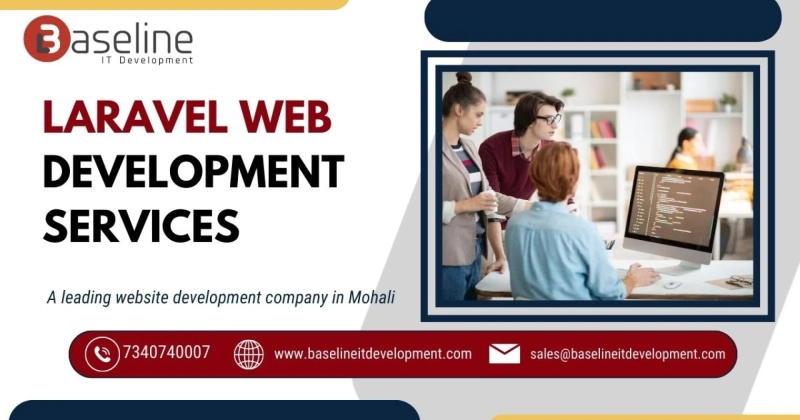PHP continues to hold its position as one of the most widely used and enduring web development languages in the industry. Among the plethora of PHP frameworks available, Laravel emerges as a standout option for crafting web applications. Best website development company in Mohali and web app development companies in India often choose Laravel due to the myriad benefits it offers. In this piece, we will delve into the factors that have established Laravel as the leading PHP framework.
Main Reasons to Choose Laravel:
MVC Support and Object-Oriented Approach:
Laravel follows an expressive and elegant syntax with an MVC architecture, making it easy to work with an object-oriented approach. The Model, View, and Controller-based pattern helps in structuring the application logically, enhancing its maintainability and scalability.
Built-in Authentication and Authorization:
Laravel provides an out-of-the-box configuration for the Authentication and Authorization system. With just a few artisan commands, developers can equip their applications with secure user authentication and access control, saving valuable development time.
Modular and Extensible:
Laravel's modular and extensible nature allows developers to easily incorporate additional functionalities through its Picklist directory, which houses over 5,500 packages. This ensures that developers always find the tools they need to build feature-rich applications.
Multiple File System Support:
Laravel supports both local storage and cloud storage services like Amazon S3 and Rackspace Cloud Storage. Its consistent API allows seamless switching between different storage options, providing flexibility and scalability.
Artisan Console:
Laravel includes its command-line interface called Artisan, offering various utilities for package asset publishing, database migration management, and boilerplate code generation for controllers, models, and migrations. Artisan significantly eases the development process and can be extended with custom commands.
Templating Engine - Blade:
Laravel's internal Blade Template Engine converts templates into cached PHP code, optimizing performance. Blade supports a collection of control structures like conditional statements and loops, simplifying the view rendering process.
Task Scheduling:
Introduced in Laravel 5.0, the Scheduler allows programmatic scheduling of recurring tasks, leveraging the croon daemon to execute Artisan jobs that perform the scheduled tasks.
Eloquent ORM:
Laravel's built-in ORM implementation, Eloquent, offers the best object-relational mapping in PHP. Eloquent provides an expressive syntax for database interactions, simplifying database operations and relationships.
Events and Broadcasting:
Laravel's broadcasting concept facilitates real-time data updates and live feeds in modern web applications. Broadcasting allows seamless communication between the server-side and client-side, enabling real-time data retrieval.
Testing:
Laravel supports unit testing by default, and the framework itself includes tests to detect and prevent regressions. PHP unit tools can be easily integrated for efficient unit testing of Laravel applications.
Easy Installation via Composer:
Laravel can be quickly installed using Composer, a dependency manager that simplifies package installation and management. This enables developers to focus on coding rather than dealing with manual installations.
Log Management:
Laravel uses the Monolog library for efficient log management, making it easy to add and write logs with clear configuration options.
Composer Integration:
Laravel's dependency manager, Composer, streamlines the inclusion of external packages, eliminating the need for manual downloads and installations.
User-Friendly Routes:
Laravel offers user-friendly routes that are easy to read and create, simplifying the routing process for developers.
Form Validations:
Laravel provides a straightforward way to include form validations using the Validator library, ensuring data integrity and security.
Email Sending:
Laravel simplifies the process of sending HTML-format emails by organizing the code efficiently and offering global configuration options.
Conclusion:
Laravel's extensive range of features and benefits make it the go-to PHP framework for web application development. Its MVC support, object-oriented approach, built-in authentication, modular design, and convenient features like Artisan Console and Blade Templating Engine contribute to its popularity among developers. With Laravel's robust testing support and Composer integration, developers can ensure smooth development and create feature-rich web applications with ease.
Read also
Accelerate Your Business Processes With BigCommerce Stripe Automation


